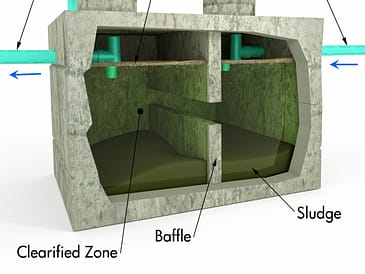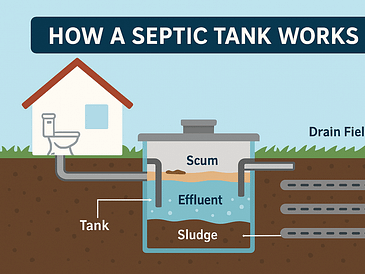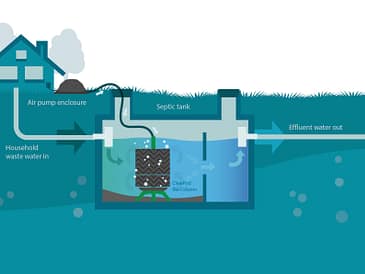Avoiding Legal Troubles: Michigans Septic Tank Laws Explained
Are you a homeowner in Michigan? Do you rely on a septic system to handle your wastewater needs? If so, it is crucial that you familiarize yourself with Michigan’s septic tank laws to avoid potential legal troubles. Septic systems play a vital role in maintaining public health and protecting the environment, which is why the state has strict regulations in place.
In this comprehensive article, we will delve into the intricacies of Michigan’s septic tank laws and provide you with a detailed understanding of what is expected from homeowners. We will walk you through the step-by-step process of septic tank inspection requirements, explain drainfield regulations, and shed light on navigating sewage system laws. By the end of this article, you can rest assured that you will be armed with the knowledge needed to keep your septic system compliant and functioning optimally.
Understanding Michigan’s Septic Tank Regulations
When it comes to septic tank regulations, Michigan is known for its stringent guidelines aimed at protecting public health and the environment. Familiarizing yourself with these regulations is crucial to avoid legal troubles and maintain a compliant septic system. In this section, we will delve into the key aspects of Michigan’s septic tank laws, providing you with a comprehensive understanding of the requirements.
The Zoning and Regulatory Framework: Michigan’s septic tank regulations are established by various state agencies, including the Department of Environmental Quality (DEQ) and local health departments. These agencies enforce rules related to system design, installation, operation, and maintenance. It’s vital to note that while statewide guidelines exist, local health departments may have additional or more specific requirements.
Bearing this in mind allows homeowners to navigate through the complexity of Michigan’s regulatory landscape confidently.
Siting and Permitting: One essential aspect of septic tank regulations in Michigan revolves around siting and permitting requirements. Before installing a new septic system or making modifications to an existing one, it is crucial to obtain the necessary permits from your local health department. The siting process involves evaluating factors such as soil conditions, property lines, setbacks from water sources, topography, and other considerations that ensure safe wastewater disposal.
Maintaining open communication with your local health department ensures compliance during the siting process while guaranteeing a smoothly functioning wastewater treatment system.
Tank Design and Capacity: Another critical aspect regulated by Michigan law is tank design and capacity. The size of your septic tank depends on factors such as household size and water usage. State regulations provide specific guidelines on minimum sizes based on estimated daily flow rates or bedroom count. Moreover, the design of the tank must adhere to construction standards to prevent structural failures and minimize environmental risks.
By ensuring your septic tank is properly designed and meets capacity requirements, you can have peace of mind knowing that it will efficiently handle your waste while protecting Michigan’s natural resources.
The Importance of Complying with Septic System Laws in Michigan
Complying with septic system laws in Michigan is of utmost importance for several reasons. Firstly, it ensures the protection of public health and the environment. Septic systems that are not properly maintained or fail to meet regulatory standards can pose significant health risks by contaminating groundwater sources and nearby bodies of water. By adhering to the laws, you contribute to safeguarding the integrity of Michigan’s natural resources, creating a cleaner and healthier environment for all.
Secondly, complying with septic system laws helps prevent legal troubles and costly penalties. The state of Michigan takes septic regulations seriously, and failure to comply can result in fines, lawsuits, or even potential criminal charges. These legal consequences not only impact your finances but also tarnish your reputation. By understanding and following the laws governing your septic system’s maintenance and disposal practices, you can avoid unnecessary legal battles and focus on enjoying a worry-free life.
Furthermore, complying with septic system laws promotes community well-being and harmony. Your adherence to these regulations demonstrates respect for your neighbors’ health and property values. Foul odors or contaminated water caused by faulty septic systems can have a detrimental effect on overall community happiness. By taking responsibility for your septic system’s proper functioning, you contribute to a clean and pleasant living environment for yourself as well as those around you.
A Step-by-Step Guide to Septic Tank Inspection Requirements in Michigan
In order to comply with Michigan’s septic tank laws and avoid legal troubles, it is crucial to understand the inspection requirements for your septic system. By following a step-by-step guide, you can ensure that your septic tank remains in compliance and functions optimally.
Step 1: Know Your Inspection Schedule
The first important step is to be aware of the inspection schedule mandated by Michigan’s regulations. The frequency of inspections varies depending on factors such as the size of your property, number of bedrooms in your house, and type of septic system you have. It is essential to consult with local authorities or a qualified septic professional to determine how often inspections are required for your specific situation.
By understanding the inspection schedule, you can plan ahead and ensure that necessary arrangements are made to guarantee timely inspections. This proactive approach not only keeps you compliant with the law but also helps identify potential issues early on, saving you from costly repairs in the future.
Step 2: Hire a Certified Inspector
When it comes time for an inspection, it is crucial to hire a certified inspector who has extensive knowledge of Michigan’s septic tank laws. Look for professionals who are licensed by recognized organizations or have received training from reputable institutions. Their expertise will ensure that all aspects of your septic system are thoroughly assessed and evaluated.
Working with a certified inspector not only guarantees compliance during the inspection process but also provides peace of mind knowing that an experienced professional is overseeing the health and functionality of your septic system. Their insights may even offer suggestions for improvement or maintenance techniques that can prolong the lifespan of your system.
Step 3: Prepare Your Septic System
Prior to the inspection, it is crucial to prepare your septic system to ensure accurate assessment. Begin by locating and uncovering access points such as the septic tank lids and inspection ports. Clear any vegetation or debris that may obstruct visibility or hinder the inspector’s access.
Additionally, make sure all fixtures in your house are accessible and functioning properly. This includes sinks, toilets, showers, and drains. The inspector will need to check for any signs of backups or leaks that could indicate problems with your septic system.
By thoroughly preparing your septic system for inspection, you demonstrate a commitment to compliance and show that you take the maintenance of your septic tank seriously. This level of attentiveness not only ensures a smooth inspection process but also establishes a positive relationship with local authorities who enforce septic tank laws.
Ensuring Compliance with Michigan Drainfield Regulations
When it comes to septic systems, the drainfield plays a crucial role in ensuring proper wastewater treatment and disposal. Michigan has specific regulations in place to protect the environment and public health by governing the design, installation, and maintenance of drainfields. To stay in compliance with these regulations and avoid legal troubles, it is essential to understand and adhere to the requirements imposed by Michigan’s drainfield regulations.
Maintaining an effective drainage system is key for preventing groundwater contamination and potential health hazards. Michigan requires regular inspection and monitoring of drainfields to ensure their functionality. Property owners are responsible for maintaining an adequate vegetative cover over drainfields, as this helps prevent erosion and promotes better absorption of excess wastewater. By following these regulations diligently, you not only meet legal obligations but also contribute to the preservation of Michigan’s natural resources.
In order to maintain a compliant septic system, it is necessary to be mindful of the sizing restrictions for drainfields set by Michigan’s regulations. These requirements are based on factors such as soil type, site conditions, and estimated wastewater flow. Ensuring that your property’s septic system is properly designed and sized will help prevent overloading of the drainfield and reduce the risk of system failure or environmental contamination. It is advisable to consult with a professional engineer or licensed septic contractor who can provide guidance on meeting these regulatory standards.
Navigating Michigan’s Sewage System Laws
Michigan’s sewage system laws are designed to protect public health and the environment. Navigating these laws can be complex, but with the right knowledge and understanding, you can ensure compliance and avoid legal troubles. Here are some key factors to consider.
1. Understanding the Permitting Process
In Michigan, obtaining a permit for a new sewage system or making modifications to an existing one is crucial. The first step is to consult your local health department or regulatory agency to determine the specific requirements for your area. They will guide you through the application process, including submitting necessary documents and ensuring compliance with setback distances, water table levels, and other regulations.
A thought-provoking point: By diligently following the permitting process, you contribute to safeguarding Michigan’s natural resources and promoting sustainable growth in your community.
2. Maintaining an Approved Design
Navigating Michigan’s sewage system laws also involves ensuring that your system meets approved design standards. This requires working closely with professional engineers or contractors who specialize in septic systems. They will help you plan an appropriate system based on factors such as soil composition, site topography, and household size.
A creative twist: By investing in a well-designed septic system that adheres to state regulations, you not only prevent potential legal issues but also contribute to preserving Michigan’s pristine natural landscapes for generations to come.
3. Regular Maintenance and Inspections
Maintaining your septic system is vital for its longevity and compliance with Michigan’s sewage system laws. Regularly schedule inspections by certified professionals who can assess its condition, identify any potential problems early on, and provide recommendations for maintenance or repairs if needed.
An optimistic viewpoint: By prioritizing the regular maintenance and inspections of your septic system, you not only ensure its smooth operation but also minimize the risk of costly repairs or legal consequences. This proactive approach allows you to enjoy a stress-free and environmentally responsible lifestyle.
Common Challenges and Pitfalls to Avoid
While navigating Michigan’s septic tank laws, it is crucial to be aware of the common challenges and pitfalls that may arise. By understanding these obstacles, you can take proactive measures to avoid legal troubles and ensure compliance with the regulations.
1. Neglecting Regular Maintenance: One of the biggest mistakes homeowners make is neglecting regular maintenance of their septic system. Failing to pump out the tank periodically can lead to clogs, backups, and potential violations. To avoid this pitfall, schedule routine inspections and maintenance with a licensed professional who can assess your system’s condition and recommend necessary actions.
Proactive Tip: Take pride in maintaining a healthy septic system by following an annual maintenance schedule. Regular pumping not only ensures compliance but also extends the longevity of your system while minimizing costly repairs.
2. Improper Waste Disposal: Disposing of improper waste materials down the drain or toilet poses a significant risk to your septic system’s functionality, leading to blockages or damage. It is essential to educate yourself about what should never enter your septic tank, including chemicals, oils, paints, sanitary products, or excessive amounts of household cleaners.
Proactive Tip: Implement environmentally friendly practices such as using biodegradable cleaning products or opting for natural alternatives like vinegar for cleaning purposes. These small changes not only contribute to a healthier environment but also safeguard your septic system from unnecessary stress.
3. Ignoring Warning Signs: Ignoring warning signs of a failing septic system can have severe consequences both financially and legally. If you notice slow drains, foul odors near plumbing fixtures or in your yard, greener grass over the drainfield area, or gurgling sounds in your plumbing system, it is crucial to address these issues promptly.
Proactive Tip: Don’t delay! At the first sign of trouble, contact a professional to assess the situation and recommend appropriate solutions. Remember, a proactive approach can save you from costly repairs and potential legal ramifications.
By staying mindful of these common challenges and pitfalls, you are well-equipped to navigate Michigan’s septic tank laws successfully. By taking proactive steps and following best practices for maintenance and waste disposal, you can ensure a compliant septic system while protecting both your property value and the environment.
Tips for Maintaining a Healthy, Compliant Septic System in Michigan
Proper maintenance of your septic system is crucial to ensure its longevity and compliance with Michigan’s septic tank laws. By following these tips, you can keep your system in optimal condition and avoid unnecessary legal troubles.
1. Regular Pumping and Inspections
Schedule regular pumping of your septic tank to prevent solids from accumulating and clogging the system. Michigan recommends pumping every three to five years, but it may vary depending on factors such as household size and water usage. Additionally, regular inspections by a licensed professional will identify any potential issues before they escalate, saving you time, money, and legal headaches.
Vibrant Content: Think of regular pumping and inspections as investing in the health of your septic system. By being proactive, you can prevent major problems down the line and enjoy a worry-free environment while contributing to the preservation of Michigan’s natural resources.
2. Mindful Water Usage
Conserving water not only benefits the environment but also reduces strain on your septic system. Be conscious of excessive water use – repair leaky faucets or toilets promptly, install low-flow fixtures when possible, and spread out laundry or dishwasher usage throughout the week instead of overwhelming the system all at once.
Vibrant Content: Embrace mindful water usage as an opportunity to develop sustainable habits that benefit both your household budget and our precious planet. By being aware of every drop that goes down the drain, you are actively contributing to a greener future while maintaining compliance with Michigan’s regulations.
3. Proper Waste Disposal
Avoid flushing hazardous materials or chemicals down your drains or toilets as they can harm both your septic system and the environment. Dispose of household chemicals, pharmaceuticals, and other harmful substances at designated collection sites to prevent contamination and septic tank malfunctions.
Vibrant Content: By practicing responsible waste disposal, you are safeguarding not only your septic system but also the purity of Michigan’s beautiful natural landscapes. Join the movement towards a cleaner and healthier environment for future generations by making informed choices about waste management.
The Benefits of Staying Informed and Adhering to Regulations
Adhering to Michigan’s septic tank laws not only ensures legal compliance but also brings forth an array of benefits that extend beyond avoiding legal troubles. By staying informed and actively following regulations, homeowners can safeguard their health, protect the environment, preserve property values, and contribute to the overall well-being of their communities.
One significant benefit of staying informed about septic tank laws is the preservation of public health. By adhering to regulations, homeowners prevent the contamination of groundwater and surface water sources with harmful bacteria and pathogens found in untreated sewage. This proactive approach guarantees a healthier living environment for residents and helps prevent waterborne diseases from spreading throughout the community.
Moreover, maintaining a compliant septic system contributes to environmental conservation. By properly managing wastewater disposal, homeowners play a crucial role in protecting local ecosystems. Adherence to regulations means minimizing nutrient pollution that can lead to algal blooms in lakes and rivers. Preserving water quality not only benefits aquatic life but also enhances recreational opportunities for residents, such as swimming, boating, or fishing.
Conclusion
In conclusion, navigating Michigan’s septic tank laws may initially seem like a daunting task, but with the right knowledge and proactive approach, it is possible to avoid legal troubles and ensure a healthy, compliant septic system. By understanding the regulations, following inspection requirements, and maintaining regular maintenance routines, Michigan residents can not only protect themselves from potential fines or penalties but also contribute to the preservation of the environment and public health. Remember, compliance with these laws is not just a legal obligation; it is a responsible choice that benefits both individuals and the community at large. So let us embrace these regulations as an opportunity to create a cleaner and safer future for ourselves and generations to come.





